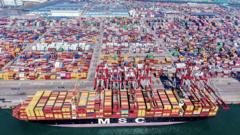In a significant turn of events in the ongoing trade conflict, China has made it clear that discussions regarding tariffs between the United States and itself will only proceed if President Trump revokes the existing import taxes.
China Urges Trump to Eliminate Tariffs for Trade Resolution

China Urges Trump to Eliminate Tariffs for Trade Resolution
Beijing demands the cancellation of US tariffs as a prerequisite for resuming trade discussions amid escalating tensions.
China's Commerce Ministry has publicly stated that there have been no ongoing trade talks, countering claims from the Trump administration. The trade conflict between the two economic giants sees escalating tariffs, with the US imposing levies as high as 145% on Chinese imports while China retaliates with 125% tariffs on American goods, including recently returned Boeing aircraft.
Commerce Ministry spokesman He Yadong emphasized that for the US to demonstrate a genuine desire to resolve the trade dilemma, it must eliminate all "unilateral tariff measures." He stated, "The person who tied the bell must untie it,” highlighting the need for the US to take the first step towards negotiations.
The Foreign Ministry also reaffirmed that no consultations or negotiations had taken place regarding tariffs, dismissing reports suggesting otherwise as false. This contradicts assertions from Trump that negotiations were active, which were further undermined by US Treasury Secretary Scott Bessent, who confirmed that discussions had yet to commence but hinted at potential for significant agreements in the future.
While Trump had hinted at a potential reduction of tariffs, stressing that he would be "very nice" during negotiations with China, his remarks have also included sharp views on the matter. He suggested on social media that Boeing should consider defaulting on the orders placed by China due to the ongoing trade frictions, labeling China's actions as detrimental to the US for years. Moreover, he reiterated concerns about the influx of synthetic opioids from China, which he claims has contributed to a significant public health crisis in the US.
The continuing rift poses challenges not only to the nations directly involved but also to foreign companies operating in China. The Chinese government recently convened a roundtable addressing the repercussions of US tariffs on more than 80 foreign firms, with a call to turn challenges into opportunities amidst adversity.
As the trade war continues, the prospects for a resolution remain unclear, hinging on reciprocal moves from both governments to foster dialogue and ultimately achieve a trade agreement beneficial to both sides.
Commerce Ministry spokesman He Yadong emphasized that for the US to demonstrate a genuine desire to resolve the trade dilemma, it must eliminate all "unilateral tariff measures." He stated, "The person who tied the bell must untie it,” highlighting the need for the US to take the first step towards negotiations.
The Foreign Ministry also reaffirmed that no consultations or negotiations had taken place regarding tariffs, dismissing reports suggesting otherwise as false. This contradicts assertions from Trump that negotiations were active, which were further undermined by US Treasury Secretary Scott Bessent, who confirmed that discussions had yet to commence but hinted at potential for significant agreements in the future.
While Trump had hinted at a potential reduction of tariffs, stressing that he would be "very nice" during negotiations with China, his remarks have also included sharp views on the matter. He suggested on social media that Boeing should consider defaulting on the orders placed by China due to the ongoing trade frictions, labeling China's actions as detrimental to the US for years. Moreover, he reiterated concerns about the influx of synthetic opioids from China, which he claims has contributed to a significant public health crisis in the US.
The continuing rift poses challenges not only to the nations directly involved but also to foreign companies operating in China. The Chinese government recently convened a roundtable addressing the repercussions of US tariffs on more than 80 foreign firms, with a call to turn challenges into opportunities amidst adversity.
As the trade war continues, the prospects for a resolution remain unclear, hinging on reciprocal moves from both governments to foster dialogue and ultimately achieve a trade agreement beneficial to both sides.






















